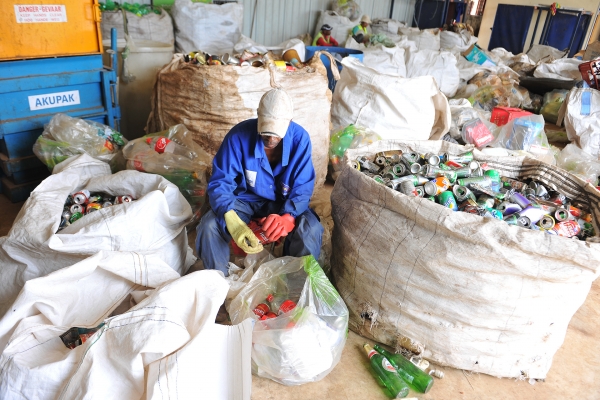
Mar 1, 2021 | Cases, News
Today, the ICJ will argue in a case before the Johannesburg High Court that the rights to housing and work for persons who work to informally reclaim waste must be protected in line with international law and standards.
Today the International Commission of Jurists will be appearing as an amicus curiae in the matter of Ryckloff-Beleggings (Pty) Ltd v Ntombekhaya Bonkolo and Others. In this matter, the Socio-Economic Rights Institute of South Africa represents over 100 informal waste reclaimers who are opposing an application for eviction from their homes by, Ryckloff-Beleggings (Pty) Ltd, the owner of the property.
The ICJ, represented by Lawyers for Human Rights, is asking the Court to fully consider the impact of any eviction order it grants on the rights to housing and work of the reclaimers and the right to health of both the reclaimers and the broader community, particularly in the context of the ongoing COVID-19 pandemic.
Timothy Fish Hodgson, Legal Adviser on Social, Economic and Cultural Rights at the ICJ said:
“It is inhumane to render people homeless as a result of eviction from their homes, but when doing so also strips them of their ability to make a living, the impact on their dignity is even greater. South Africa has a duty to ensure the protection of the reclaimers’ rights to housing and work.”
Many of the informal reclaimers in this matter have lived on the property for long periods of time and they argue that the eviction will result in them being rendered homeless. Many make a living by collecting, sorting, recycling, and selling valuable materials disposed of as waste at and near their homes.
The land upon which they live is not just their home, but also allows them to make a living. In the South African context job opportunities are scarce with an official unemployment rate as high as 32.5 percent.
The ICJ brief calls on the Court to take account of international human rights law relating to the right to work, and South Africa’s international legal obligations and its own domestic law in terms of the right to housing.
In the event of their eviction being permitted by the Court, the reclaimers seek the provision of alternative accommodation which will not deprive them of their ability to make a living, a request which the ICJ contends is consistent with the requirements of international human rights law.
Thandeka Chauke, ICJ’s legal representative in this matter and an Attorney at Lawyers for Human Rights said:
“Especially in light of the economic devastation brought on by the COVID-19 pandemic, it is essential that Courts act as guardians of the human rights of the marginalized in our society. Informal reclaimers’ role in our society should be recognized and they should not be stripped of their homes and livelihoods without sufficient effort being made by government to come to their aid.”
For the ICJ’s heads of arguments, click on ICJ_Amicus_Curiae_Heads_of_Argument_Ryckloff.
For more information about the case, click here.
CONTACT:
Timothy Fish Hodgson, Legal Adviser on Social, Economic and Cultural Rights, e: [email protected]
Tanveer Rashid Jeewa, Communications and Legal Officer, e: [email protected]
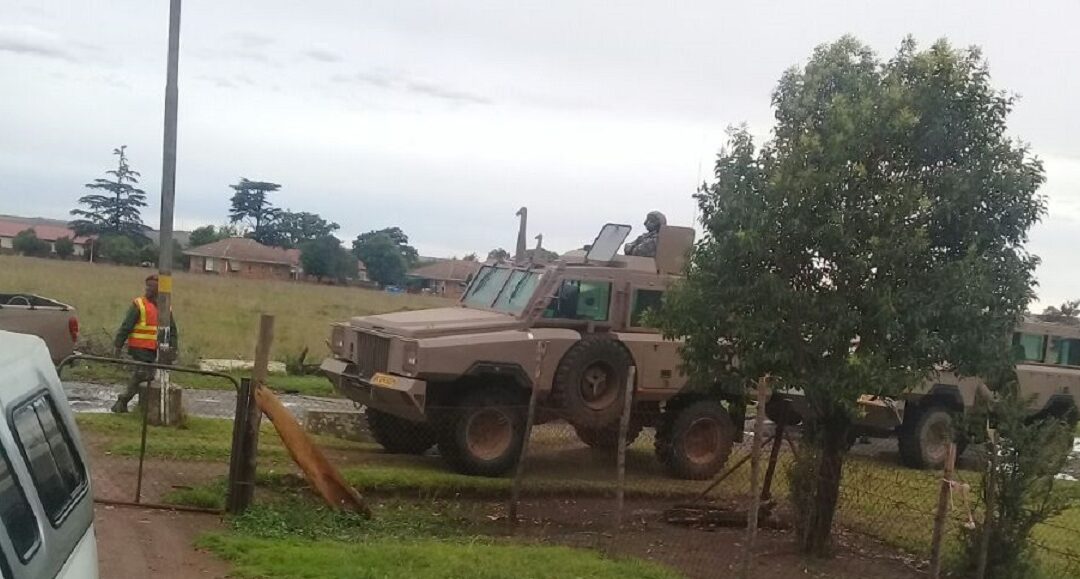
Jul 31, 2020 | Advocacy, Open letters
The ICJ and the South African Human Rights Defenders Network (SAHRDN) have written to the United Nations Special Rapporteur on the Situation of Human Rights Defenders, the African Commission on Human and Peoples’ Rights Special Rapporteur on Human Rights Defenders, and the Chairperson of African Commission on Human and Peoples’ Rights.
They have detailed the continued intimidation and harassment of the residents of Happiness village by the South African National Defence Force (SANDF).
“We have written to the Special Rapporteurs because the SANDF is unrelenting in its abuse of the resident’s despite the best efforts of their legal representatives and repeated court orders,” said ICJ Legal Adviser in South Africa Tim Fish Hodgson.
“A community leader was placed under house arrest guarded by four soldiers for seven days. Another resident was subjected to a punishment by which was told to lie flat on the ground and ‘pray to his God’ for simply leaving his home. Others have been assaulted. The SANDF deliberately conducts military exercises near the residents’ homes late at night to scare and intimidate them. All this with utter disregard for the law and in direct violation of a number of court judgments and orders”, he added.
The residents, who were forcibly and violently evicted from Marievale military base beginning in 2017, have repeatedly been granted court orders by the High Court declaring such evictions unlawful and directing the SANDF to refrain from harassing, threatening and intimidating the residents and not to restrict their movement.
Despite this, and in the midst of the COVID-19 pandemic, further evictions and constant harassment and intimidation continues unabated and has intensified to a point that the residents describe the SANDF as having “laid siege” to their homes in Happiness Village which is adjacent to Marievale military base.
Soldiers now police checkpoints, preventing visitors from entering the area and even journalists have been prevented from entering Happiness Village. The residents’ legal representatives were only allowed to visit a single community representative under armed military guard.
As the letter reveals, the SANDF’s actions amount to violations of the residents’ right to adequate housing protection in terms of the South African Constitution, the African Charter on Human and People’s Rights and the International Covenant on Economic, Social and Cultural Rights.
The intimidation, harassment, humiliation and assault of the residents’ amount to violations of the residents’ rights to liberty and security of person and may also amount to cruel, inhumane and degrading treatment or punishment in violation of the South African Constitution and international human rights law.
They seem to be geared at making the resident’s lives intolerable in order to secure evictions “through the backdoor”, which is explicitly prohibited in South African law.
The residents, represented by Lawyers for Human Rights, will once again be in urgent court on July 31 seeking an interdict to prevent further harassment, intimidation and restrictions on their movement by the SANDF. The legal representatives of the SANDF have indicated that they intend to oppose their application.
The ICJ has therefore implored the Special Rapporteurs to:
1. Call on the SANDF, the Minister of Defence and Military Veterans and on the Ekurhuleni Municipality to desist from any further evictions, relocation, intimidation, harassment, humiliation, and assault of the Marievale community residents;
2. Call on the SANDF, the Minister of Defence and Military Veterans and the Ekurhuleni Municipality to immediately lift and ensure the non-recurrence of restrictions on the movement on Happiness Village residents;
3. Call on the President of South Africa, as the Commander in Chief of the SANDF, to take appropriate action to ensure that the human rights violations that the residents of Marievale have suffered at the hands of the SANDF on a continuous basis since 2017 be investigated, and that appropriate action be taken to ensure access to justice and effective remedies for the residents; and
4. Call on the Parliamentary Portfolio Committee on Defence and Military Veterans to ensure the accountability of the Minister of Defence and Military Veterans for the human rights violations to which the SANDF has subjected the residents on a continuous basis since 2017.
Read the full letter here.
SouthAfrica-SAHRDN-ICJ Letter to SRs on HRDs-Advocacy-open letters-2020-ENG
Contact:
Tim Fish Hodgson (ICJ Legal Adviser) t: +27828719905; e: timothy.hodgson(a)icj.org
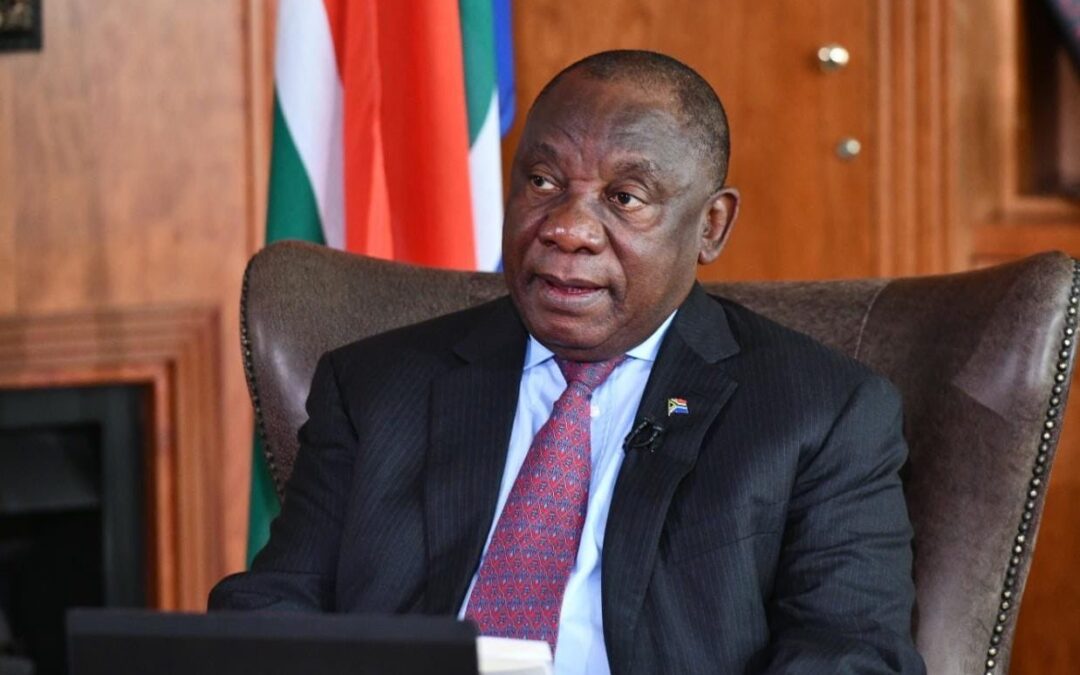
Apr 28, 2020 | Advocacy, News, Open letters
The ICJ today called on the South African government to take measures to ensure access to justice and the full fulfillment of the economic, social and cultural rights of all in the country.
The South African authorities must also remove legal hurdles in accessing just compensation for rights violations occurring during nationwide lockdown, the ICJ said.
The call comes as South Africa enters its final week of a lockdown period, which initially began on 26 March 2020. Since the beginning of the lockdown period the ICJ has been working closely with a broad coalition of local civil society organizations and movements called the C19 People’s Coalition.
“The ICJ applauds South Africa on its announcement that it will commit 10% of its GDP to a social relief and economic support package addressing poverty and in inequality which has been exacerbated by COVID-19,” said Arnold Tsunga, ICJ Africa Director.
“However we note with concern the high levels of repression and human rights abuses committed by enforcement officers enforcing Lockdown Regulations and the inadequacy of social assistance measures to ensure an effective elimination of poverty in accordance with South Africa’s international and domestic human right obligations.”
- Repression and human rights abuses by enforcement officers during Lockdown
Both the Disaster Management Act and Lockdown Regulations enacted in terms of it create doubt about whether victims of violations of human rights in the enforcement of lockdown will be able to claim compensation for such violations.
The ICJ has therefore written to President Cyril Ramaphosa (photo) and Speaker of the National Assembly Thandi Modise calling on the authorities to make the necessary legal amendments required to ensure the full protection of the right to access to justice, which includes the right to effective remedies and reparation.
The ICJ calls on authorities to ensure the amendment of the National Disaster Act and Lockdown Regulations to ensure that victims of human rights abuses have full and effective access to the right to remedy and reparation including compensation.
- Inadequate Social Assistance provided
Despite the large stimulus package announced by President Ramaphosa on 21 April, the C19 People’s Coalition has correctly argued that the new COVID-19 social grant of R350 ($18.44 USD) per month for unemployed persons is less than a third of the R1227 ($64.65) that government itself estimates individuals require to be lifted out of poverty.
In addition, the increase of the Child Support Grant of R500 ($26.35) per month appears, contrary to what the President’s announcement suggested, to be allocated per caregiver not per child thus drastically reducing its potential impact.
The ICJ calls on authorities to ensure the full provision of a social safety net to all in South Africa by: 1) raising the levels of all non-contributory social assistance benefits to a level that ensures an adequate standard of living for recipients and their families; and 2) ensuring that those between the ages of 18 and 59 with little or no income have access to social assistance.
These two measures were among those specified in the Concluding Observations of the Committee on Economic, Social and Cultural Rights to South Africa.
South Africa declared a moratorium on all evictions during the lockdown period on 26 March after local organizations and the ICJ had called for such a move.
Later amendments to Lockdown Regulations made it a criminal offence for any person to evict any other person. Despite this, evictions continue in some places unabated as is illustrated by statements of Abahlali BaseMjondolo and Abahlali BaseMjondolo Women’s League late last week.
These evictions have sometimes been violent and accompanied by serious allegations of attempted murder of community members and human rights defenders.
The ICJ calls on authorities to ensure the immediate cessation of all evictions. The President of South Africa and the Parliament of South Africa must make sure that police officers, security and other companies and government officials participating in evictions are clearly, decisively and publicly held to account.
Those carrying out evictions should be prosecuted in accordance with Lockdown Regulations. The police and prosecuting authorities should also investigate and where sufficient evidence exists pursue prosecution of those found to have committed crimes of violence or similar offences against those who are subjected to or defend against such evictions.
“The continued violent attacks experienced by human rights defenders and those simply trying to retain their homes is unacceptable. The time has come for the President of South Africa and Parliament of South Africa to intervene directly to prevent any further such attacks generally, but in particular with regard to Abahlali BaseMjondolo settlements in KwaZulu-Natal,” added Arnold Tsunga, ICJ Africa Director.
Contact:
Tim Fish Hodgson, ICJ Legal Adviser, t: +2782871990 ; e: tim.hodgson(a)icj.org
Shaazia Ebrahim, ICJ Media Officer, t: +27716706719 ; e: shaazia.ebrahim(a)icj.org
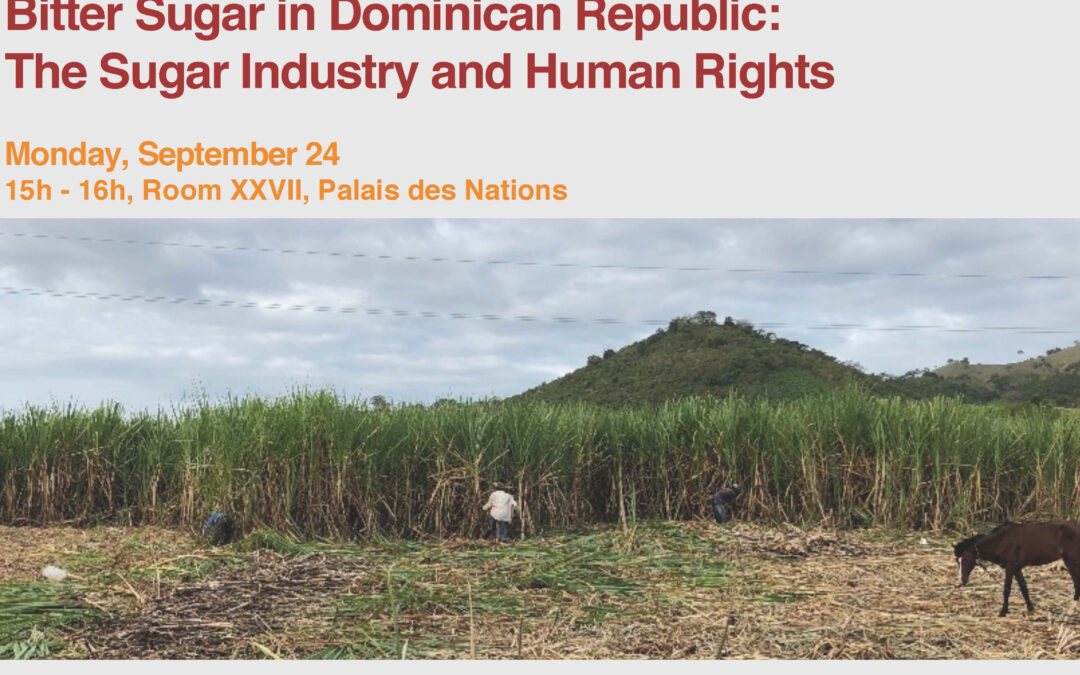
Sep 19, 2018 | Events, News
The ICJ will host the side event, “Bitter Sugar in Dominican Republic: The Sugar Industry and Human Rights” on Monday, 24 September 2018 from 15:00-16:00, Room XXVII, at the Palais de Nations in Geneva.
Together with tourism, sugar production is one of the major industries and one of the biggest sources of employment in the Dominican Republic.
This small Caribbean State remains one of the world’s top sugar suppliers to the USA.
While sugar production and export in the Dominican Republic is a major source of income for the country, the adverse impacts of its production are various.
Destruction of the environment, reduced access to land for local communities, forced evictions and precarious working conditions in sugarcane plantations are unfortunately a reality in many regions of this Caribbean State.
Whilst the Dominican Republic has shown in past years a preparedness to abide by and implement international standards on matters related to business and human rights, the country continues to face many challenges and evidence of human rights violations on the ground still portrays a complicated reality.
Two recent examples involving the sugar cane industry illustrate ongoing concern about human rights abuses in the Dominican Republic.
In 2016, armed agents of one of the largest sugar producers in the country, Central Romana Corporation, forcibly evicted from their homes more than 60 families during the night.
No alternative accommodation or reparations have been provided to the victims to redress the destruction of their homes and the trauma caused by the violence of the evictions.
In 2017, the Vicini Group, the second main sugar producing company in the country, used the pesticide Glyphosate in such a way that many were in danger of death and that it destroyed the crops of peasant farmers and workers.
To date, the human rights violations in both cases continue to be unpunished.
There is a growing international concern that the sugar cane industry in the Dominican Republic is somehow able to act with impunity when it comes to human rights violations.
Bearing in mind the upcoming Universal Periodic Review of Dominican Republic, in which all UN Member States will examine the human rights situation in the country, this side event is aimed at informing and shedding light on this little known reality in the Dominican Republic as well as to brief State delegations about the importance of addressing this issue in their review of the Dominican Republic.
The event will also provide a space for constructive dialogue among various actors, including the Government of the Dominican Republic.
Panelists:
– Carlos Lopez, Senior Legal Adviser, International Commission of Jurists
– Fr. Damián Calvo Martin OP, Director, Centro de Teología Santo Domingo de Guzman
– María Magdalena Álvarez Gálvez, victim of forced evictions by Central Romana Corp.
Moderator: Rory Gogarty, High Court of England and Wales
Interpretation: Will be provided from English to Spanish and Spanish to English
Dominican Republic Sugar Industry Side Event Flyer 24 Sept. (flyer of the event in pdf)
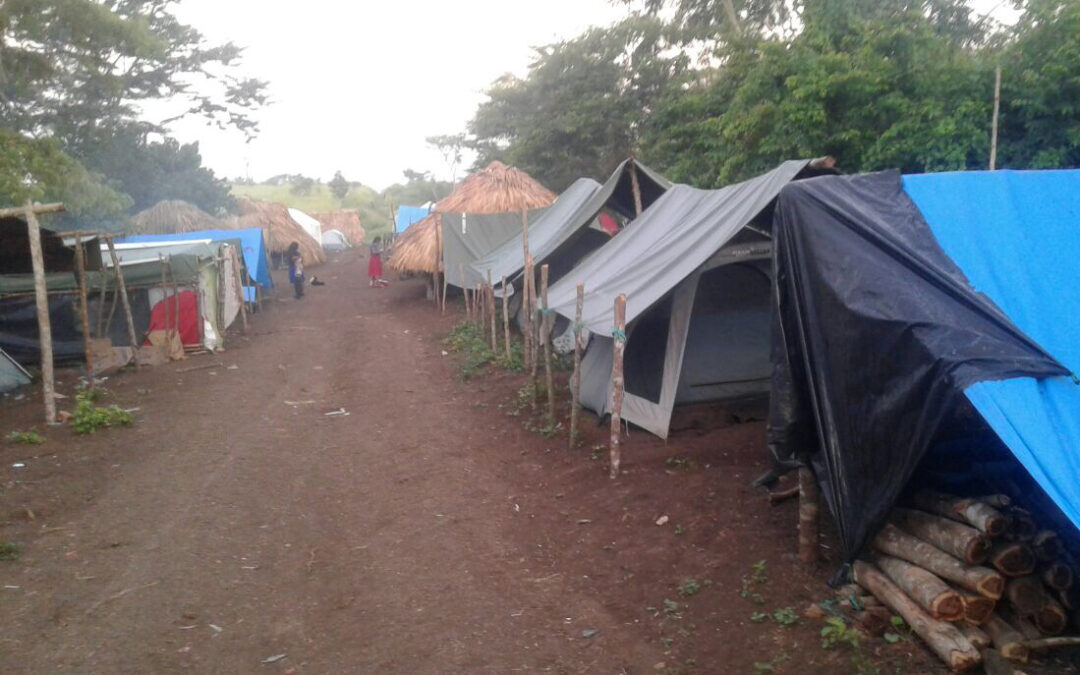
Jul 27, 2018 | News
On 25 July, the ICJ visited the displaced persons of the Laguna Larga community, who were forcibly evicted from their homes over a year ago.
These displaced persons are now living in makeshift tents in infra-human conditions in the El Desengaño community, municipality of Candelaria, State of Campeche on the frontier between Guatemala and Mexico.
Their health and well-being are at serious risk.
On 8 September 2017, the Inter-American Commission on Human Rights (IACHR) granted precautionary measures in favour of the evicted and displaced community of Laguna Larga (Resolution 36/2017 Precautionary Measures No 412-17), calling on the Guatemalan authorities to adopt the “necessary measures to protect the rights to life and to personal integrity of the beneficiaries, through measures designed to improve, among other aspects, their sanitary and health conditions, in particular of children, women and the elderly”.
To date, the Guatemalan authorities have taken no action to implement the precautionary measures.
The ICJ was able to observe that the only measure adopted by the Guatemalan State has been to provide the displaced community with two teachers to give classes to the children.
However, the ICJ could also observe that the educational installations are precarious, too hot and very dark, which makes it difficult to give classes.
No sanitary nor health services have been provided by the Guatemalan authorities. On 24 July, a child died only 30 hours after her birth, seemingly a consequence of lack of medical attention.
Neither have other precautionary measures concerning food, access to water and housing been implemented.
The ICJ is deeply concerned that the Guatemalan State has not fulfilled the requirements of the IACHR and that after a year, the rights to life and personal integrity of the displaced community of Laguna Larga is at risk of irreparable harm.
In the face of the inaction of the Guatemalan authorities, members of the Laguna Larga community with the support of Mexican and Guatemalan organizations have managed to implement various projects to provide drinking water, electricity, food and health services.
However, despite these important efforts, this humanitarian support remains insufficient given the serious crisis.
While the efforts of the Laguna Larga community and Mexican and Guatemala non-governmental organizations have been an example of civil society organization, it in no way exonerates, substitutes or reduces the responsibility of the Guatemalan State to guarantee the rights to life and personal integrity of the displaced population and to implement the precautionary measures ordered by the IACHR.
Ramon Cadena, Director of ICJ’s Central American Office, said:
“Given this situation, the ICJ urges the Guatemalan authorities immediately to fulfil the Inter-American Commission on Human Rights’ precautionary measures 412-17 and to resume the dialogue that was started before the eviction. According to international standards, the State should provide reparations for all the harm and prejudice caused.”





